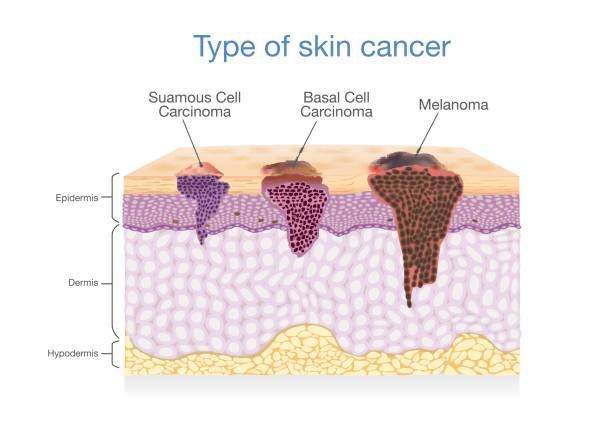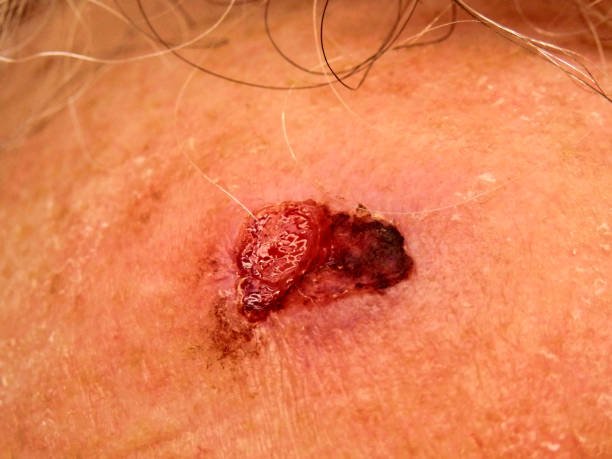
What is Skin Cancer “Basal Cell Carcinoma”? Basal Cell Carcinoma Signs, Symptoms and Treatment
Strong exposure to ultraviolet rays during the day not only easily causes sunburn or dark spots, but may also lead to skin cancer. Australian Hollywood heavyweight actor “Wolverine” Hugh Jackman once revealed that he was diagnosed with “basal cell carcinoma” skin disease in 2013 because he did not have the habit of wearing sunscreen in the past. Although his symptoms improved after surgical treatment Although the disease improved, it still recurred, requiring repeated surgical removal of the lesions.
Not only Hugh Jackman, there are also quite a few patients in the UK who are deeply troubled by basal cell carcinoma. Over 60,000 people in the UK develop a BCC or SCC each year. What are the causes of basal cell carcinoma? We will let you know about the common symptoms and treatment methods of “basal cell carcinoma”, the most common skin cancer in the UK, as well as some tips on preventing “basal cell carcinoma” skin cancer.
What is skin cancer “basal cell carcinoma”? What is the cause of the disease?
Basal cell carcinoma is a malignant tumor of the skin, mainly located under the epidermis and composed of abnormally developed cells. It is the most common type of skin cancer among all skin cancers.
Basal cell carcinoma is common in people over 60 years old, and the older you are, the higher the risk of developing the disease. Long-term exposure to ultraviolet rays without sun protection is the main cause of basal cell carcinoma. The lesions tend to occur on the face, neck, and Forearm or back of hand
In addition, having a family history of skin cancer, ingesting water containing the heavy metal arsenic, being exposed to radiation, or having an immune deficiency are all risk factors for developing basal cell carcinoma.

Signs and symptoms of skin cancer “basal cell carcinoma”
The lesions of basal cell carcinoma usually appear as red, flesh-colored or black tumors. At first, they look like ordinary moles and are easily ignored by patients. It is not until the lesions gradually grow, the expansion of capillaries can be seen around the tumor, and even more serious symptoms such as ulcers and bleeding appear, that the patient will notice it.
When should I seek medical examination for skin cancer “basal cell carcinoma”?
The chance of cancer cell spread in basal cell carcinoma is only about 1% to 1‰. Once metastasis begins, it will spread from the skin locally to deep tissues such as muscles, bones or nerves. The most common areas where cancer cells metastasize are: Lymph nodes and lungs. Therefore, it is recommended that patients should seek medical attention as soon as possible if they have the above symptoms and ask a doctor for further diagnosis to prevent the spread of cancer cells.
Diagnostic Methods for Basal Cell Carcinoma
The diagnosis of basal cell carcinoma is similar to that of other skin cancers. At first, the doctor will make a preliminary diagnosis for the patient through physical examination. If the doctor suspects the possibility of skin cancer, he will further use biopsy and observe the specimen through a microscope. To determine the type and stage of skin cancer.
In addition, doctors may also use imaging examinations such as computed tomography (CT), X-ray, and magnetic resonance imaging (MRI) depending on the situation to confirm the condition.

How is basal cell carcinoma treated?
Doctors will mainly give appropriate treatment suggestions based on the size, location, number and type of the basal cell carcinoma, as well as the patient’s age and health status.
For patients with basal cell carcinoma who want to cure basal cell carcinoma, doctors usually recommend surgery to remove the lesions to effectively eradicate them. However, if the cancer cells metastasize, the patient may need to receive chemotherapy, radiotherapy and other treatments. Ensure that cancer cells do not remain in their body.
In addition to surgical resection, other treatments for basal cell carcinoma include photodynamic therapy, curettage and electrocautery, cryotherapy, and topical application of drugs.
Preventing basal cell cancer starts with sun protection!
The most important way to prevent basal cell carcinoma is to protect yourself from the sun, especially at noon when the light is strongest. Remember to wear a long-sleeved jacket, long pants, a hat, and use parasols or sunscreen lotion to block ultraviolet rays. Reduce the risk of basal cell carcinoma or other skin cancers.











